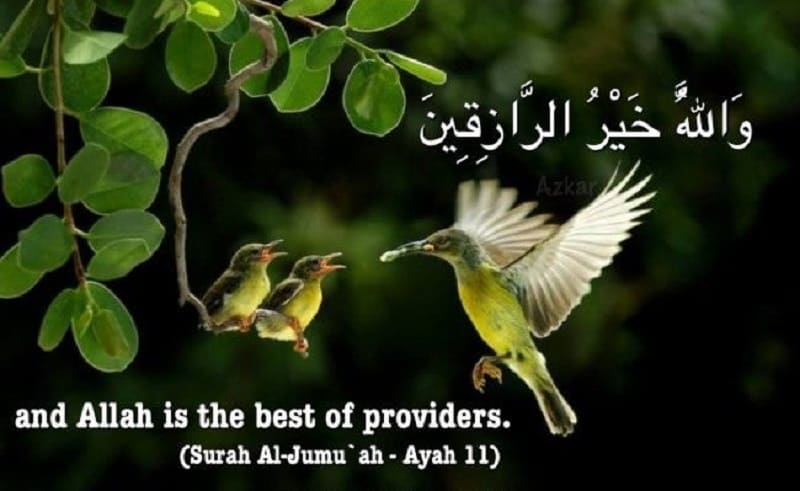
In Islam, Rizq (provision or sustenance) refers to everything that Allah has preordained for a person, including wealth, health, knowledge, relationships, and opportunities. It encompasses not only financial income but all forms of sustenance that support human life and well-being. The concept of Rizq is deeply rooted in the Islamic belief system, emphasizing that Allah is the sole provider, and distributes Rizq according to His wisdom and justice. This article explores the meaning of Rizq in Islam, its implications, and the reasons behind the differences in Rizq among individuals.
Ready to expand your understanding of Islam? Join Al Dirassa Institute now and gain access to expert-led online courses tailored for all levels!
Don’t want to go through the translation anymore?
30 free minutes with your qualified Egyptian teacher.
The term Rizq originates from the Arabic root word “ر ز ق,” which means “to provide” or “to nourish.” In Islamic theology, Rizq is considered a divine gift from Allah. It includes everything that sustains human life, whether material or spiritual. The Qur’an emphasizes that Rizq is not merely about wealth or resources; it also pertains to the blessings of health, family, knowledge, and contentment. It is Allah alone who decrees the sustenance of every living being, as mentioned in the Qur’an:
“And there is no creature on earth but that upon Allah is its provision, and He knows its place of dwelling and place of storage. All is in a clear register.” (Surah Hud, 11:6)
This verse emphasizes that Allah is responsible for every creature’s sustenance, which is predetermined and recorded in Al-Lawh Al-Mahfuz (the Preserved Tablet). The assurance of Rizq being under Allah’s control relieves believers from the anxiety of provision, as their sustenance is guaranteed.
One of the most commonly asked questions is why Rizq differs among people. Some individuals appear to have an abundance of wealth, while others struggle to make ends meet. Some enjoy long, healthy lives, while others face continuous hardship. This difference in Rizq can be perplexing, but Islam provides several reasons for this disparity:
Divine Wisdom and Testing:
Allah distributes Rizq based on His infinite wisdom. Life in this world is a test, and varying amounts of provision are part of this test. Allah states:
“It is He who has made you successors upon the earth and has raised some of you above others in degrees [of rank] that He may try you through what He has given you.” (Surah Al-An’am, 6:165)
This verse highlights that the disparity in provision is meant to test how individuals respond to their circumstances. Those with abundant wealth are tested in how they use their resources – whether they are grateful, charitable, and responsible. Conversely, those with less wealth are tested in their patience, reliance on Allah, and contentment.
The distribution of Rizq is also a means of cultivating essential virtues in believers, such as gratitude (shukr) and patience (sabr). Those who receive more Rizq are expected to be grateful for Allah’s blessings, while those with less are encouraged to be patient and trust that Allah will provide according to their needs. The Prophet Muhammad (PBUH) emphasized this in a Hadith:
“Look at those who are lower than you and do not look at those who are higher than you, for this is better to avoid belittling Allah’s favors upon you.” (Sahih Muslim)
This teaching encourages contentment and gratitude, reminding believers that true wealth lies not in material abundance but in spiritual and emotional fulfillment.
The disparity in Rizq also serves a communal purpose, encouraging those with more wealth to support those with less. Islam strongly emphasizes charity (sadaqah) and the redistribution of wealth to ensure that the basic needs of all community members are met. Zakat, one of the five pillars of Islam, mandates the wealthy to give a portion of their wealth to the poor and needy. This ensures a balanced society where everyone is provided for.
“Indeed, your Lord extends provision for whom He wills and restricts it. Indeed, He is of His servants Acquainted and Seeing.” (Quran 17:30)
Though rizq is preordained, Islam offers several ways to increase sustenance. These include:
Don’t miss the chance to enrich your understanding of Islam; sign up for Al Dirassa Institute’s free online courses today!
To know more: What is Islam?
Discover the experiences of our delighted clients who have thoroughly enjoyed utilizing this standout feature.
Alhamdulillah I‘m very pleased with the arabic and Qur’an lessons I receive from teacher Umm Tasneem and I‘m also content with the al-dirassa administration team who were very quick in answering any questions I had. In a month I progressed a lot and I cannot wait to continue my studies with al-dirassa. May Allah reward everyone at al-dirassa.
Verified review - view original
My Qur’an teacher is fantastic, she teaches me in a loving and kind way where I look forward to the lessons and learn so much. My Arabic teacher is equally as nice and has a lot of patience with me, she has great expertise in the field and I’ve progressed really quickly with her. Thank you Al-dirassa!
Verified review - view original

Al-dirassa Institute offers you a gift to help you begin your journey to being fluent in Arabic and learning the Quran.

Al-dirassa Institute offers you a gift to help you begin your journey to being fluent in Arabic and learning the Quran.